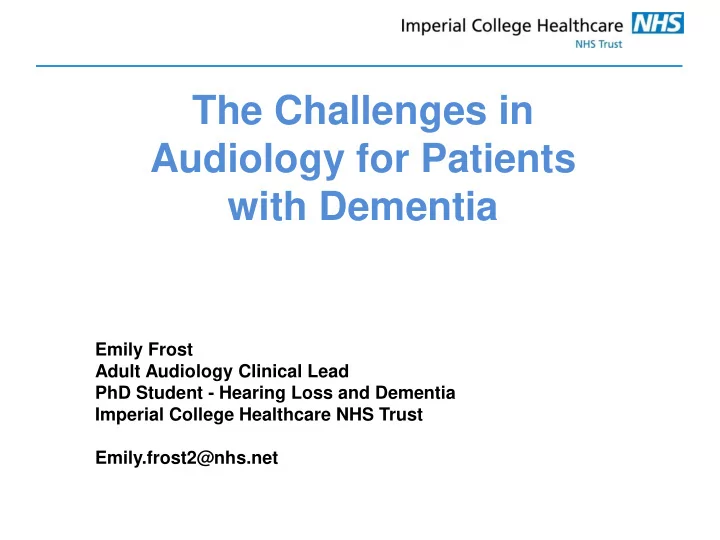

The Challenges in Audiology for Patients with Dementia Emily Frost Adult Audiology Clinical Lead PhD Student - Hearing Loss and Dementia Imperial College Healthcare NHS Trust Emily.frost2@nhs.net
Discussion Points • Significance of hearing loss • The Audiology Service • Challenges at each stage for a person with dementia • Role of hearing loss in dementia assessments • What can we do to improve?
Vital Statistics • 11 million people in the UK have hearing loss. • By 2035 there will be approximately 15.6 million. • People wait on average 10 years before seeking help for their hearing. • GPs fail to refer 30-45% to NHS audiology services. • Hearing loss may increase the risk of dementia by up to 5 times. • Around 40% of people who need hearing aids actually wear them. Action on Hearing Loss, (2015)
Living with a Hearing Loss Social Withdrawal ? Isolation Depression Participants with a mild, moderate and severe hearing loss had a 2, 3 and 5-fold increased risk of dementia compared to normal hearers after 10 years of follow-up. Lin, (2011)
Access to Services The Challenges… • Direct Access Service • Audiology is an AQP Service • E-Referral System
Access to Services The Solutions…? • Community Services • Domiciliary Service • Vulnerable patients discharge policy
Assessment • 45 Minute Appointment • Detailed History - Red Flags - Patient-Centred Approach • Ear Examination - Wax Removal
Assessment • Pure-Tone Audiometry I’m going to give you this button to hold, I would like you to press the button every time you hear a beep, even if that beep is very quiet. I’m now going to play a rushing sound into one of your ears, I would like you to ignore the rushing as much as possible and press only when you hear the beeps.
Assessment • Results - Audiogram • Management - Often Hearing Aids • Type of Hearing Aid? - Severity of HL - Manual dexterity - Eyesight - Patient preference
Treatment • 60 Minute Hearing Aid Fitting Appointment • Set the hearing aids up • Real Ear Measurements • Fine-Tuning • Subjective testing • Rely on patient feedback https://www.youtube.com/watch?v=F9n 6b3Yy5Sg
Treatment Right/Left • Give instructions - Can be simplified On/Off Volume Control • Practise Changing batteries Using the phone Cleaning How to put hearing aids in and take them out Loop System
Treatment • Batteries • Battery Book • Instructions • Cleaning Wires • Boxes INFORMATION OVERLOAD!
Follow Up • 30 Minute Appointment • 6-8 weeks after fitting appointment • Check use • Answer questions • Fine-Tune • Explain after-care
Aftercare • Batteries • Re-tubing every 6 months • Troubleshooting • Self-management
The Hearing Aid in the Drawer… • What happens next? 1. The hearing aids aren’t comfortable 2. Expectations 3. Difficult to maintain 4. Stigma 5. The hearing aids weren’t useful
Lost Hearing Aids • Hospital Admissions • Care Homes • Carers • Misplaced
Hearing Loss in Cognitive Assessment • Hearing Loss and Cognitive Impairment are often mistaken for each other. • Is hearing screened in assessments? • How many of the questions in the assessments are delivered verbally?
Age-related Hearing Loss as a Predictor? • Livingston et al. (2017) - Dementia prevention, intervention and care. • Mid-life hearing loss was the highest potential modifiable factor at 9% • Depression 4% • Social Isolation 2% • Causality and the impact of treatment is still unknown.
Overcoming These Challenges in the Future… • Ensuring hearing aid services are re-commissioned. • Focus on combined sensory health. • Collaborative approach between audiology and memory clinics. • Improve ‘dementia friendly’ approach in audiology. • Invest more in research.
Using Serious Games- My PhD • Number of ‘games’ in dementia research - Sea Hero Quest: Navigational Skills. • Developing a novel training application - Training for auditory, attentional and cognitive skills. - Testing with mild age-related hearing loss and subjective cognitive impairment. - Possibility of delaying decline with training.
Tha hank nk yo you fo for list stening. ening.
Recommend
More recommend